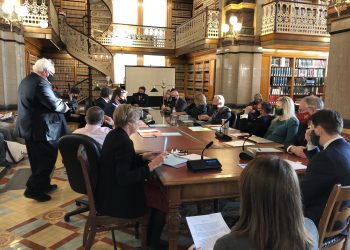DES MOINES, Iowa – Gov. Kim Reynolds signed SF 2095, the Religious Freedom Restoration Act, into law on Tuesday. The Iowa Legislature passed the bill in late February.
“Thirty years ago, the Religious Freedom Restoration Act passed almost unanimously at the federal level. Since then, religious rights have increasingly come under attack. Today, Iowa enacts a law to protect these unalienable rights—just as twenty-six other states have done—upholding the ideals that are the very foundation of our country,” Reynolds said in a released statement.
The law that takes effect immediately states that local, county, or state government action “shall not substantially burden a person’s exercise of religion,” but has to demonstrate the action is furthering a “compelling governmental interest” by using the “least restrictive means” to further the compelling governmental interest.
“Exercise of religion,” as now defined in law means the practice or observance of religion “that includes, but is not limited to the ability to act or refuse to act in a manner substantially motivated by one’s sincerely held religious belief, whether or not the exercise is compulsory or central to a larger system of religious belief.”
“Substantially burden,” is defined as “any action that directly or indirectly constrains, inhibits, curtails, or denies the exercise of religion of any person or compels any action contrary to a person’s exercise of religion and includes but is not limited to withholding of benefits; assessment of criminal, civil, or administrative penalties; or exclusion from governmental programs or access to governmental facilities.”
“Compelling governmental interest,” is defined as “a governmental interest of the highest order that cannot otherwise be achieved without burdening the exercise of religion.”
The new law now provides an avenue of judicial review for Iowans who believe their exercise of religion has been “substantially burdened.”
Iowa’s Religious Freedom Restoration Act echoes the federal Religious Freedom Restoration Act of 1993 that passed with bipartisan support and was signed into law by President Bill Clinton.
Read SF 2095 below:
SF2095















